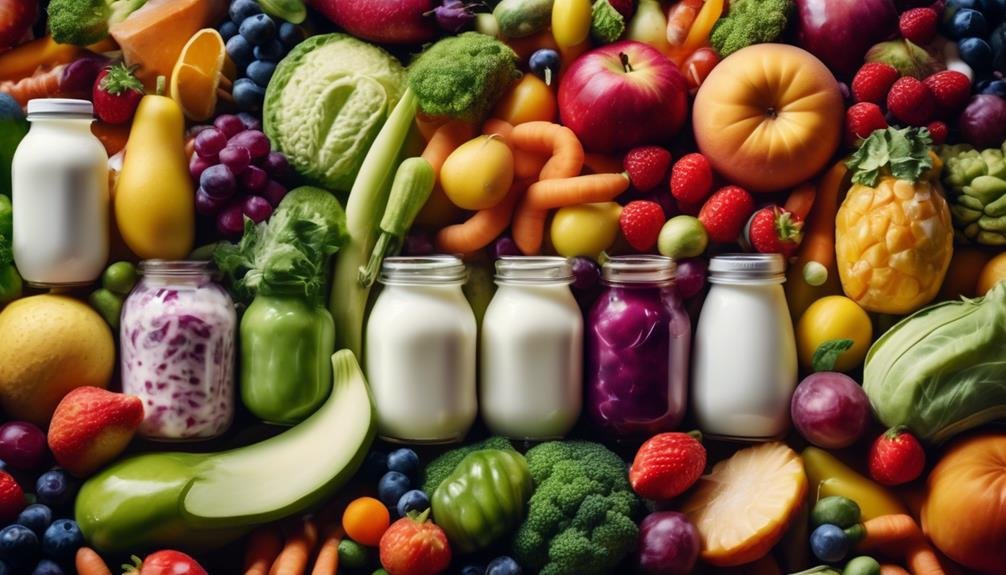"Cherishing Little Steps - A Haven for Baby and Family Journeys"
Probiotic Rich Diets for Babies
Imagine your baby's gut as a garden, teeming with life and potential. Just as you would carefully tend to your garden, ensuring it receives the right nutrients and care, it's essential to nurture your baby's gut health.
Probiotics, like the friendly bacteria that flourish in a well-maintained garden, can play a vital role in supporting your little one's digestive system and overall well-being. But where do you start? How do you incorporate probiotics into your baby's diet?
In this discussion, we will explore the benefits of probiotics for babies, the different ways to introduce them, and important considerations to keep in mind.
Get ready to cultivate a thriving gut garden for your precious bundle of joy.
Key Takeaways
- Probiotic-rich diets can support a healthy immune system in babies.
- Introducing probiotics into a baby's diet can help alleviate common digestive issues.
- Probiotics can reduce the risk of respiratory tract infections, diarrhea, and allergies in babies.
- It is important to consult with a pediatrician and follow recommended dosage guidelines when giving probiotics to babies.
What Are Probiotics?

Probiotics are live bacteria and yeasts that are beneficial for your baby's digestive system. These friendly microorganisms can be found in certain foods and supplements and are known for their ability to support a healthy gut. Probiotic strains, such as Lactobacillus and Bifidobacterium, are commonly used in baby probiotic products due to their proven benefits.
One of the key benefits of probiotics for babies is their ability to improve digestion. Probiotics help break down food and absorb nutrients more effectively, reducing the risk of digestive issues like constipation, diarrhea, and colic. They also promote a healthy balance of gut bacteria, which can support a strong immune system and reduce the risk of infections.
Studies have shown that probiotics can also help prevent and manage common infant conditions such as eczema and allergies. By modulating the immune response and reducing inflammation, probiotics can alleviate symptoms and support overall skin health.
When choosing a probiotic for your baby, opt for a product specifically formulated for infants and look for strains that have been clinically studied for their benefits. It's also important to consult with your pediatrician to ensure the chosen probiotic is safe and appropriate for your baby's age and health condition.
Incorporating probiotics into your baby's diet can have numerous benefits for their digestive health and overall well-being.
The Benefits of Probiotics for Babies
Babies can experience numerous benefits from incorporating probiotics into their diet. Probiotics are live bacteria and yeasts that are good for your baby's gut health. They can help maintain a healthy balance of beneficial bacteria in their digestive system, which is important for overall health and well-being.
One of the main benefits of probiotics for babies is that they can support a healthy immune system. Studies have shown that probiotics can help reduce the risk of certain infections, such as respiratory tract infections and diarrhea. They can also help strengthen the immune response, making it more effective in fighting off harmful bacteria and viruses.
Probiotics can also help alleviate common digestive issues in babies, such as colic, constipation, and reflux. They can improve digestion and nutrient absorption, leading to better overall digestive health.
When choosing probiotics for your baby, it's important to look for specific strains that are recommended for infants. Bifidobacterium infantis and Lactobacillus rhamnosus are two commonly recommended strains for babies. These strains have been shown to be safe and effective in supporting infant gut health.
Choosing the Right Probiotic for Your Baby

When selecting the appropriate probiotic for your little one, consider the specific strains recommended for infant gut health. Not all probiotics are created equal, and choosing the right strains can have a significant impact on your baby's well-being. Look for probiotics that contain strains such as Bifidobacterium infantis and Lactobacillus rhamnosus, as these have been shown to be beneficial for infant gut health.
Dosage recommendations for probiotics in babies vary depending on their age and specific health needs. It's essential to follow the instructions provided by your pediatrician or the manufacturer of the probiotic product. Generally, for healthy infants, a daily dosage of around 1 to 10 billion colony-forming units (CFUs) is considered safe and effective.
When administering probiotics to your baby, it's crucial to pay attention to any changes in their digestion, bowel movements, or overall well-being. If you notice any adverse reactions or if your baby's symptoms worsen, consult with your pediatrician.
Incorporating Probiotics Into Breast Milk or Formula
To ensure optimal gut health for your baby, consider incorporating probiotics into their breast milk or formula. Probiotics are beneficial bacteria that can help support your baby's digestion and strengthen their immune system. Research suggests that probiotics may help prevent colic, allergies, and other digestive issues in infants.
If you're breastfeeding, you can take probiotic supplements yourself to increase the probiotic content in your breast milk. Studies have shown that probiotics can pass through breast milk and benefit your baby's gut health. Alternatively, you can also directly give your baby probiotic drops or powder specifically formulated for infants.
For formula-fed babies, look for commercially available infant formulas that already include probiotics. These formulas are specially designed to provide the necessary nutrients and probiotics for your baby's growth and development.
If you're making homemade baby food, you can also incorporate probiotics into your little one's meals. Fermented foods, such as yogurt and kefir, are excellent sources of natural probiotics. You can puree these foods or mix them with other ingredients to create delicious and nutritious meals for your baby.
As your baby grows into a toddler, you can introduce probiotic-rich snacks into their diet. Options like yogurt, fermented vegetables, and cheese can be great choices for boosting their probiotic intake.
Remember to consult with your pediatrician before introducing any new foods or supplements to your baby's diet. They can provide guidance on the appropriate dosage and help you make informed decisions regarding probiotic incorporation.
Introducing Probiotic-Rich Foods to Your Baby's Diet

Incorporating probiotic-rich foods into your baby's diet can be beneficial for their gut health and overall well-being. Introducing probiotics gradually to your baby's diet is important to ensure their little tummy adjusts well. Here are some probiotic-rich foods that are suitable for older babies:
- Yogurt: This creamy delight is packed with probiotics like Lactobacillus and Bifidobacterium, which promote a healthy digestive system.
- Kefir: Similar to yogurt, kefir is a fermented milk drink that contains a variety of beneficial probiotics. It can be a tasty addition to your baby's diet.
- Sauerkraut: Made from fermented cabbage, sauerkraut is rich in probiotics and can be introduced in small amounts to your baby's meals.
- Miso: A traditional Japanese seasoning made from fermented soybeans, miso is a good source of probiotics and can be added to soups or other dishes.
- Pickles: Fermented pickles, made from cucumbers or other vegetables, can also provide probiotics to your baby's diet. Just make sure to choose pickles that are low in sodium.
Remember to consult with your pediatrician before introducing any new foods to your baby's diet, especially if they've any allergies or medical conditions.
Precautions and Considerations When Giving Probiotics to Babies
Before introducing probiotics to your baby's diet, it's important to consider certain precautions and factors to ensure their safety and well-being.
Probiotics are generally considered safe for infants, but it's always recommended to consult with your pediatrician before starting any new dietary supplements.
Precautions include checking for any allergies or sensitivities your baby may have to specific strains of probiotics. Additionally, it's important to choose a reputable brand that has been tested for safety and quality.
Dosage considerations are also crucial, as giving your baby too many probiotics can potentially lead to digestive discomfort or other side effects. The appropriate dosage will depend on your baby's age, weight, and overall health. Start with a low dose and gradually increase it if needed, while closely monitoring your baby's response.
It's also essential to understand that probiotics aren't a substitute for medical treatment, and if your baby has a specific health condition, it's important to follow your pediatrician's recommendations.
Probiotics for Babies With Specific Health Conditions

If your baby has specific health conditions, incorporating probiotics into their diet may provide additional support for their digestive health. Probiotics are beneficial bacteria that can help restore the balance of gut flora and promote a healthy digestive system.
Here are some ways probiotics can be beneficial for babies with specific health conditions:
- Probiotics and reflux: Research suggests that certain strains of probiotics can help reduce symptoms of reflux in infants. They may help improve digestion and reduce the frequency and severity of reflux episodes.
- Probiotics and eczema: Studies have shown that probiotics can be effective in preventing and managing eczema in babies. They can help strengthen the immune system and reduce inflammation, which are important factors in the development of eczema.
- Probiotics and allergies: Some evidence suggests that probiotics may help reduce the risk of allergies in babies. They can modulate the immune response and promote tolerance to potential allergens.
- Probiotics and constipation: Probiotics can help regulate bowel movements and promote regularity in babies with constipation. They can improve the consistency of stools and reduce discomfort.
- Probiotics and diarrhea: Research indicates that probiotics can be helpful in reducing the duration and severity of diarrhea in infants. They can help restore the balance of gut bacteria and improve gut health.
It's important to note that every baby is different, and it's essential to consult with a pediatrician before introducing probiotics or making any changes to your baby's diet.
Probiotic Supplements for Infants
When considering probiotic supplements for your infant, it's vital to consult with a pediatrician. They can help determine the appropriate dosage and strain that best suits your baby's specific needs. Probiotics are live microorganisms that offer health benefits when consumed in adequate amounts. However, the effectiveness of probiotic supplements in infants is still a topic of ongoing research.
Different probiotic strains have varying effects on the body, so it's crucial to select the right one for your baby. Lactobacillus and Bifidobacterium are commonly used strains in infant probiotic supplements. Lactobacillus is known to aid in digestion and support a healthy immune system, while Bifidobacterium helps maintain a balanced gut microbiota.
The dosage of probiotics for infants depends on factors such as age, health condition, and the specific strain being used. The pediatrician will provide guidance on the appropriate dosage, ensuring your baby receives the optimal amount without any potential risks.
It is important to note that probiotics shouldn't replace medical treatment for specific health conditions. Always consult with a healthcare professional before introducing any new supplements to your baby's routine.
FAQs About Probiotic-Rich Diets for Babies

To better understand the benefits and considerations of probiotic-rich diets for babies, let's explore some frequently asked questions:
- Are probiotics safe for babies?
- How much probiotics should I give to my baby?
- Can probiotics cause any side effects?
- When is the best time to introduce probiotics to my baby's diet?
- Can I give my baby probiotics if they're on antibiotics?
Probiotic safety is a common concern among parents. Rest assured, probiotics are generally safe for babies when given in appropriate dosages. As with any supplement, it's important to consult with your pediatrician before starting your baby on probiotics.
Determining the right probiotic dosage for your baby is essential. The dosage may vary depending on your baby's age, weight, and health condition. Your pediatrician can guide you in finding the appropriate dosage that suits your baby's needs.
While probiotics are generally well-tolerated, some babies may experience mild side effects such as gas or bloating. These symptoms usually resolve on their own and aren't a cause for concern.
Introducing probiotics to your baby's diet can be done as early as infancy. However, it's always best to consult with your pediatrician to ensure it aligns with your baby's individual circumstances.
If your baby is taking antibiotics, introducing probiotics can help restore the natural balance of gut bacteria. Again, consult your pediatrician for guidance on the timing and dosage.
Frequently Asked Questions
How Long Should I Give Probiotics to My Baby?
You should give probiotics to your baby for as long as recommended by their healthcare provider. Probiotic dosage for infants can help support their immune system and promote a healthy gut.
Are There Any Side Effects of Giving Probiotics to Babies?
Giving probiotics to babies can have some side effects, such as gas or bloating. However, research suggests that the potential benefits, like preventing gastrointestinal infections and boosting immune system development, outweigh these risks.
Can Probiotics Help With Colic in Infants?
Probiotic strains have shown effectiveness in reducing colic symptoms in infants. They can help alleviate discomfort and promote a healthier digestive system. Consider incorporating probiotic-rich foods into your baby's diet for potential relief.
Can Probiotics Be Given to Premature Babies?
Giving probiotics to premature babies can help improve their health. Research suggests that probiotic supplementation can reduce the risk of necrotizing enterocolitis and other gastrointestinal issues in preterm infants.
Are All Probiotics Safe for Babies?
Not all probiotics are safe for babies. It's important to consider the specific strains of probiotics and any potential safety concerns. Speak to your pediatrician to determine the best probiotic option for your baby.
Conclusion
In conclusion, incorporating probiotics into your baby's diet can have numerous benefits. It can help support their digestive health, strengthen their immune system, and even improve their overall well-being.
Whether you choose to introduce probiotic-rich foods or opt for probiotic supplements, it's important to consult with your pediatrician and choose the right option for your baby.
Remember to always prioritize your baby's health and consider any specific health conditions they may have before introducing probiotics into their routine.


